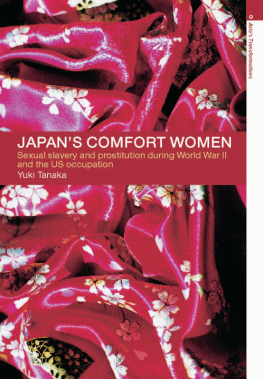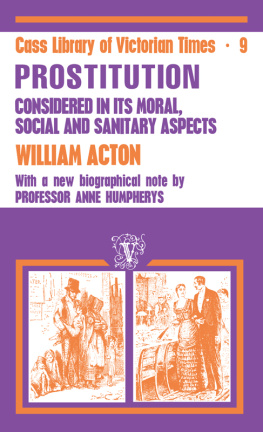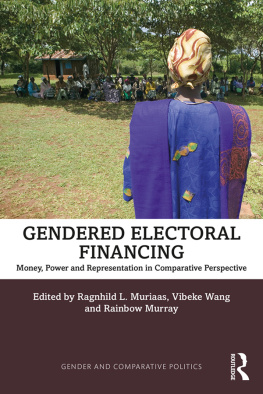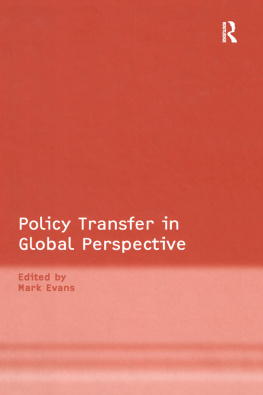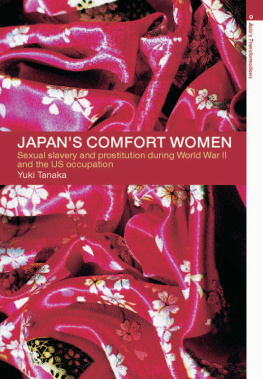Kuo - Prostitution policy: revolutionizing practice through a gendered perspective
Here you can read online Kuo - Prostitution policy: revolutionizing practice through a gendered perspective full text of the book (entire story) in english for free. Download pdf and epub, get meaning, cover and reviews about this ebook. City: London;New York;United States, year: 2005;2002, publisher: New York University Press, genre: Religion. Description of the work, (preface) as well as reviews are available. Best literature library LitArk.com created for fans of good reading and offers a wide selection of genres:
Romance novel
Science fiction
Adventure
Detective
Science
History
Home and family
Prose
Art
Politics
Computer
Non-fiction
Religion
Business
Children
Humor
Choose a favorite category and find really read worthwhile books. Enjoy immersion in the world of imagination, feel the emotions of the characters or learn something new for yourself, make an fascinating discovery.

Prostitution policy: revolutionizing practice through a gendered perspective: summary, description and annotation
We offer to read an annotation, description, summary or preface (depends on what the author of the book "Prostitution policy: revolutionizing practice through a gendered perspective" wrote himself). If you haven't found the necessary information about the book — write in the comments, we will try to find it.
Kuo: author's other books
Who wrote Prostitution policy: revolutionizing practice through a gendered perspective? Find out the surname, the name of the author of the book and a list of all author's works by series.
Prostitution policy: revolutionizing practice through a gendered perspective — read online for free the complete book (whole text) full work
Below is the text of the book, divided by pages. System saving the place of the last page read, allows you to conveniently read the book "Prostitution policy: revolutionizing practice through a gendered perspective" online for free, without having to search again every time where you left off. Put a bookmark, and you can go to the page where you finished reading at any time.
Font size:
Interval:
Bookmark:
Thank you for buying this ebook, published by NYU Press.
Sign up for our e-newsletters to receive information about forthcoming books, special discounts, and more!
Sign Up!
A publisher of original scholarship since its founding in 1916, New York University Press Produces more than 100 new books each year, with a backlist of 3,000 titles in print. Working across the humanities and social sciences, NYU Press has award-winning lists in sociology, law, cultural and American studies, religion, American history, anthropology, politics, criminology, media and communication, literary studies, and psychology.
Prostitution Policy
Revolutionizing Practice through a Gendered Perspective
Lenore Kuo

NEW YORK UNIVERSITY PRESS
New York and London
2002 by New York University
All rights reserved.
Library of Congress Cataloging-in-Publication Data
Kuo, Lenore.
Prostitution policy : revolutionizing practice through
a gendered perspective / Lenore Kuo.
p. cm.
Includes bibliographical references and index.
ISBN 0-8147-4763-9 (cloth : alk. paper)
1. ProstitutionUnited States. 2. FeminismUnited States.
3. ProstitutesLegal status, laws, etc.
4. ProstitutesUnited StatesSocial conditions. I. Title.
HQ144 .K86 2002
306.740973dc21 2002007814
New York University Press books are printed on acid-free paper, and their binding materials are chosen for strength and durability.
Manufactured in the United States of America
10 9 8 7 6 5 4 3 2 1
Numerous people, organizations, and institutions have provided generous support over the many years it has taken to complete this book.
First and foremost, I thank my dear friend Frank Anechiarico, who encouraged me from the outset to research my passiongendered public policyand whose unwavering support throughout this project has been truly remarkable. I also express my deepest gratitude to my ex-husband, James Kuo, without whose consistent encouragement I would never have begun this voyage, and to Dena Whitebook, without whose wisdom I could never have remained afloat.
Among the many individuals who shared their specialized knowledge with me, I particularly thank Petra Baas, Stefi Barna, Kein Beekman, Bridgit, Robert DelCarlo, Melissa Dittmore, Cyrille Fijnaut, George Flint, Gena, Kelly Holsopple, Jo, Carole Leigh, Alberta Nelson, Ellen Pillard, Rene Romkes, Pepper, Sari van der Poel, Marieke vanDoominck, Lucie van Mens, and Jan Visser. In addition, I am most grateful to the staffs of the various organizations and collections that were critical to researching this topic, especially those at COYOTESan Francisco; the Foundation against Trafficking in Women (STV)Utrecht, The Netherlands; the Global Alliance against Trafficking in WomenThailand; the HAP FoundationUtrecht; the IIAV (Internationaal Informatiecentum en Archief voor de Vrouwenbeweging)Amsterdam; the Mr. A. de Graaff FoundationAmsterdam; PONYNew York; the Red ThreadAmsterdam; the University of Nebraska at Omaha Library (especially Carole Larson); the University of Nevada Reno Library; and VENALeiden University, the Netherlands.
I am also most indebted to those who read earlier drafts of all or part of this manuscript and provided valuable suggestions, including Frank Anechiarico, Jean Anyon, David Butcher, Anne Donchin, Karen FalconerAl Hindi, Nanette Funk, and Nancy Holmstrom. In addition, I thank Elizabeth Ring and Richard Werner for their helpful comments on this project.
Research for this study was supported in part by numerous faculty research grants from the University of NebraskaOmaha. I also thank the Center for the Study of Women and Society of the Graduate College of the City University of New York and the Institute for Research on Women, Rutgers University, New Brunswick, New Jersey, for providing me with a sense of community and the resources required to complete this work.
I want to express my heartfelt gratitude to generous friends who have challenged me intellectually, supported me emotionally, provided a genuine community, tolerated my sometimes obsessive preoccupation with this project, and convinced me that I could complete this manuscriptreallyincluding Mary Anne Lamanna, Mary Anne Krezmian, Beverly Walker, Karen Falconer-Al Hindi, Missy Kubitschek, Martin Rosenberg, Dale Stover, and the faculty of the Womens Studies Program at the University of NebraskaOmaha. And especially, my thanks to Mary Zeleny, who, in addition to being an extraordinary friend, has taught me by example what it is to remain tenacious and courageous in the face of great adversity.
I also want to thank Despina Papazoglou Gimbel, Managing Editor at NYU Press, for her skill and patience.
During the summer of my senior year of college, I took a job waitressing at the Dangle Bar, a go-go joint in Madison, Wisconsin. Until then, though my refusal to be discreet about my relatively tame sexual life caused the occasional raised eyebrow, I had always been treated as a good girlthe kind of woman a man can take home to his mother, the sort of woman with whom men had to mind their manners. But at a place like the Dangle, men felt free to express traditional patriarchal contempt and devaluation of bad girls, and, ultimately, all women without subtly or charade. The simple fact of my working at such an establishment was sufficient for me to be reclassified as a bad girlmaking this a decidedly educational summer. Although, on the surface, most of the customers treated me with courtesy, I was aware of a prevailing misogyny which was palpable in an environment, in which in 20th century U.S. culture, women danced, nearly naked, before a group of men.
One evening, an unfamiliar customer pointed to a $50 bill he had laid on his table and asked if I was interested. I fully understood the question, and, in a polite tone, simply answered no. From that point on, nothing unusual transpired between us. He was equally polite, apparently respecting that the conversation was closed. He left a normal tip, indicating neither resentment nor embarrassment.
I remember very well the conversation I had afterwards with the bars bouncer. I remember laughing, expressing incredulity and amusement that anyone would pay what was then a fair sum of money for sexual services when, with little effort, he could have found a co-ed who would have had sex with him for free. (I was very naive!) The bouncer insisted, rather offendedly, that I was dismissing the compliment the customer had paid methat his offer of money indicated that he found me attractive enough to pay for me.
The bouncers interpretation, had an extraordinary impact on me; I knew his claim was false, indeed screamingly false, though I did not, at that time, understand why. Understanding why, understanding the general presumptions and power relations implicit in both my conversations with the customer and the bouncer, has, in a sense, been a recurring focus of a good part of my personal and professional life. In many ways, this book is the completion of a circle, of a lengthy internal dialogue which began with that incident.
So all this time she has been considered only ass, meat, twat, or stuff, to be gotten a piece of, that bitch, or this broad to be tricked out of money or sex or love! To understand finally that she is no better than other women but completely indistinguishable comes not just as a blow but as a total annihilation.
This book is intended to answer the question What adult heterosexual prostitution policy should U.S. feminists support? In a variety of respects, it radically departs from the current feminist and nonfeminist literature on prostitution policy and from public policy analyses in general.
Next pageFont size:
Interval:
Bookmark:
Similar books «Prostitution policy: revolutionizing practice through a gendered perspective»
Look at similar books to Prostitution policy: revolutionizing practice through a gendered perspective. We have selected literature similar in name and meaning in the hope of providing readers with more options to find new, interesting, not yet read works.
Discussion, reviews of the book Prostitution policy: revolutionizing practice through a gendered perspective and just readers' own opinions. Leave your comments, write what you think about the work, its meaning or the main characters. Specify what exactly you liked and what you didn't like, and why you think so.


